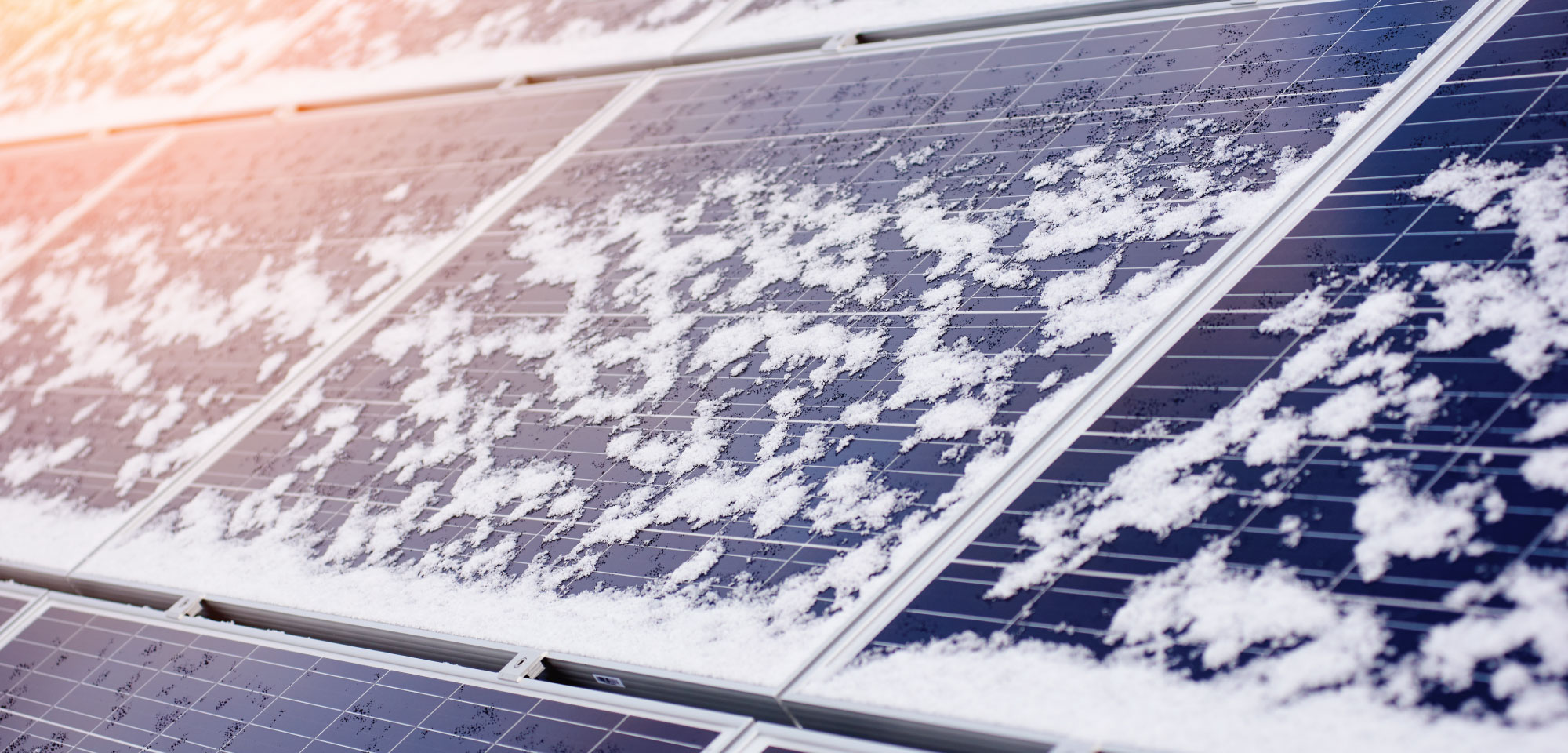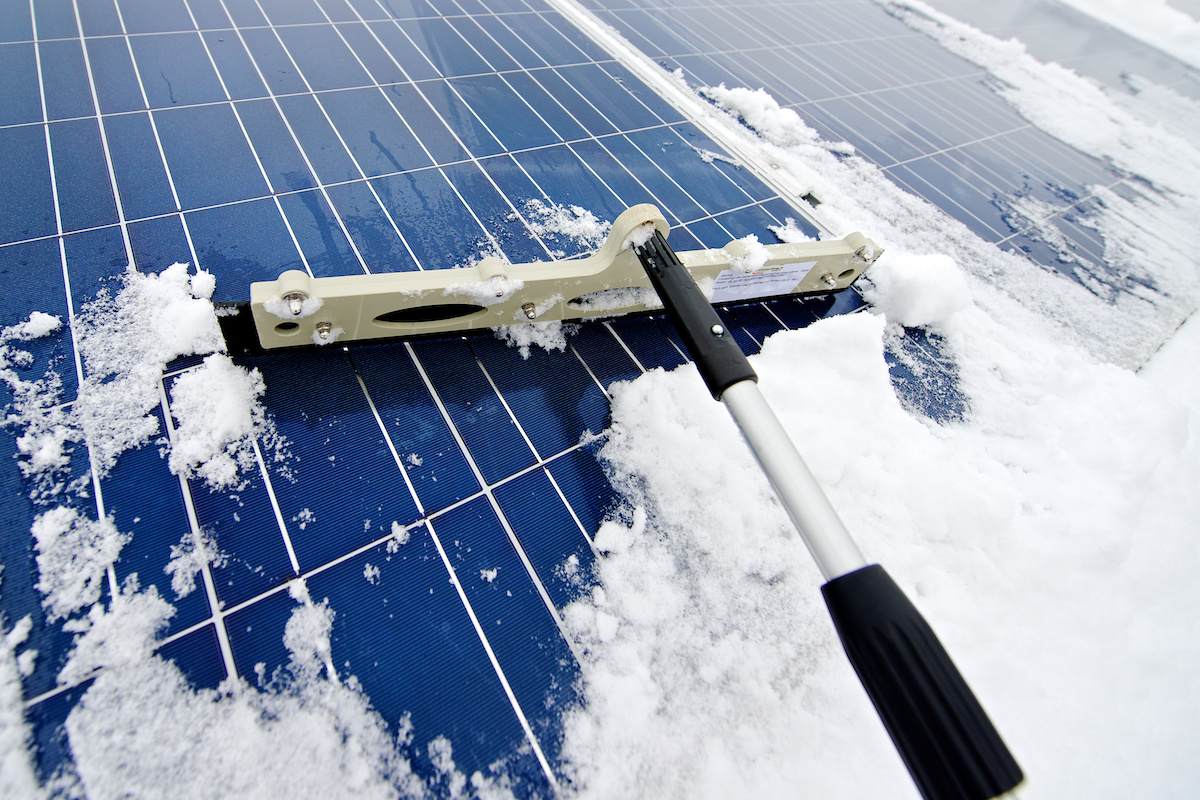Updated 11 months ago
Snow on solar panels: will solar panels work in the winter?
Written by
Ana Almerini

Find out what solar panels cost in your area
Solar panels are designed to generate electricity from the sun, so it's natural to assume that solar panels only work in sunny locations, leading Americans living in parts of the country who experience snowy winters to think that solar panels aren't a worthwhile investment.
Believe it or not, snow has much less of an impact on solar production than you may think.
So, how are solar panels affected by snow, and are they worthless in the winter? We answer those questions - and more - below.
Key takeaways
-
Solar panels work well in cold weather. While it is true that they do not work if there is snow on top of them, the snow usually slides off or melts pretty quickly.
-
Living somewhere with snowy weather is not a reason to not install solar - all you might need to do is clean off your panels with a broom and/or add snow guards to your solar panel installation.
-
States that get a lot of snow, like New Jersey and Massachusetts, are some of the best solar states in the country, due to their solar-friendly legislation and incentives.
Do solar panels work in winter?
Short answer — yes, they do. Solar panels convert sunlight into electricity, and as long as there is sunlight falling on the panels, it does not matter how hot or cold it is. Our video with SolarReviews Founder Andy Sendy discusses how different weather conditions impact how much electricity your solar panels produce:
In fact, photovoltaic (PV) solar panels work more efficiently in the cold. When panels are overheated, they can’t perform as well.
Manufacturers rate their solar panels for how well they perform based on their peak temperature, the temperature beyond which the efficiency of the solar panels starts decreasing. Once the temperature of the panels rises above that peak temperature, typically about 77 degrees Fahrenheit, their efficiency for creating electricity decreases.
In the winter, it’s less likely for solar panels to ever reach their peak temperature, which is why they are more likely to be performing at peak efficiency in cooler weather.
We will say, however, this increase in efficiency is offset by the fact that there are shorter days (and thus fewer hours of sunlight) during winter. This results in energy outputs during winter that are not drastically different from the outputs in summer, so it tends to balance out.
Do solar panels work when covered in snow?

Image: AK-DigiArt - stock.adobe.com
Solar panels cannot generate solar energy if they are covered in snow. The good news is that you can eliminate this issue by either waiting for gravity to do its job and having the snow fall off or waiting for it to melt. Another option is cleaning them off yourself.
The below factors make snow on solar panels something you don’t really need to worry about:
Solar panels are usually installed at an angle, which makes it easy for the snow to slide off.
The dark solar panels attract heat, which makes it easier to melt snow. Solar panels are designed to attract the sun’s rays and trap them. Generally speaking, solar panels are 2°C (36°F) warmer than the ambient temperature. So even a glimmer of sunlight can cause the solar panels to start warming up, and in turn, melt the snow that is on them.
Snow can act as a way to clean your solar panels (for free)! When it melts, it takes any dirt or debris along with it.
Overall, snow should not dramatically impact solar panels or how they work in the winter. Just keep in mind that if the snow does not slide off or melt for a few days, at that point your panels might not generate electricity. However, generally, snow and cold weather will not be a huge hindrance in your solar array’s ability to generate electricity.
Consider getting snow guards for solar panels
Snow guards can be added to your solar panel array to hold back large amounts of snow and prevent future solar system maintenance and repairs. Snow guards make sense if you live in a location that gets several feet of heavy snowfall throughout winter.
Because solar panels are slick, unlike standard roofing material, they do not offer much friction for the snow that collects on them. Without snow guards, snow can just rush off the panel and fall onto people or landscaping below.
The snow guards help keep the snow back so that instead of falling, it slowly melts.
Solar panels themselves should not suffer any damage due to heavy snowfall. All solar panels are built to last and are meant to withstand all kinds of weather, including snow.
Can solar panels be installed in the winter?
Yes - solar panels can be installed in the winter! However, some installers may want to wait to begin an installation until the warmer weather starts. Cold and icy conditions can be hazardous for installation work, and it might not be a risk an installer is willing to take.
However, depending on the conditions in your area, and installer may still get the panels up in colder months! That means you’ll get to take advantage of all the sunniest days of the year and start saving on your electricity bill sooner!
Final word on solar panels in the snow
If you live in a place that experiences regular winter weather, including snowfall - do not let that deter you from getting solar panels. Keep in mind, solar panels are very popular in some of the snowiest states. In fact, New York, Massachusetts, and New Jersey are all in the top ten states for solar panel installations in the country.
Whether you live in a state with full sun all year long or see your share of snowy winters, solar panels can help you save money and be more energy independent. Find out how much solar panels can save you all year long by using our solar panel cost and savings calculator.
Ana is the Marketing & Communications Manager at SolarReviews, working within the solar industry since 2020. With a Master's in Climate and Society and professional experience in marketing, she helps communicate the value of solar to homeowners and build awareness of the SolarReviews brand. On weekends you can find her at the Jersey shore, reading a book from the ever-increasing stack on her side table, or eating food someone else cooked....
Learn more about Ana Almerini